Charlie Hebdo: Paris reflects on day of defiance
- Published
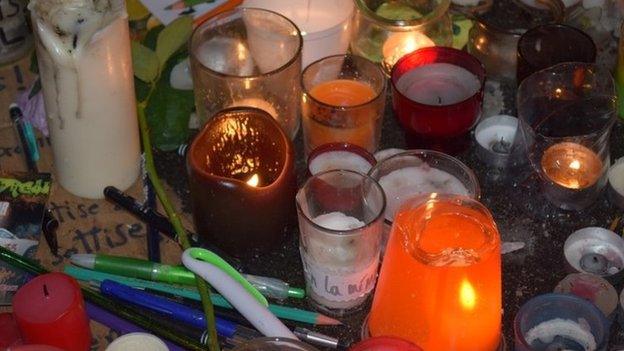
You can virtually hear the pain on Rue Nicolas Appert as the chilly wind rattles the wreaths fixed to the police barrier and ruffles the burning candles.
Quiet sobs escape among the whispers of the small but ever-changing crowd of people.
They are here paying tribute to the 12 victims of Wednesday's attack on Charlie Hebdo, which has its offices on this street.
People whisper or just stand in silence, reading the messages which plaster the walls or nestle among the candles and heaps of flowers.
Some who arrive stand very still, observing their own personal minute's silence, while police riflemen guard the street as if it houses an eternal flame.
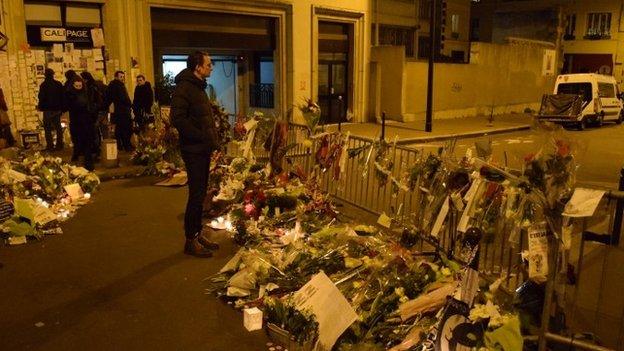
There is so much grief for the slaughtered cartoonists, whose most outrageous caricatures dot the makeshift memorial, refusing to be erased.
As mourners walk away, some of them explain why they are there.
'Inconsolable'
Because they have friends in Paris who are simply "inconsolable", says the genial man who arrived from Lille with his wife. Happy to be photographed, the couple nevertheless decline to give their names.
"And we will go to the demonstration as free men," he says. "Freedom and freedom of speech, which are essential to a democracy, have been put into question by this disaster."
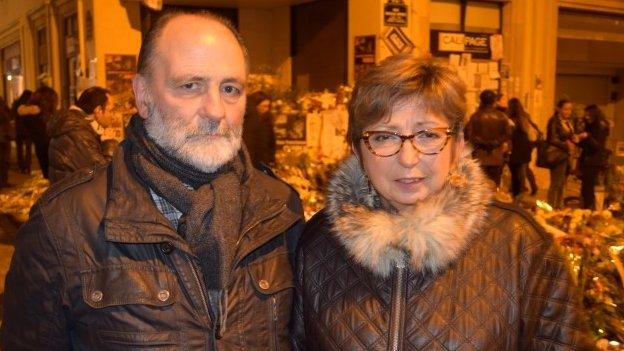
"We must all be able to live together whatever our convictions"
Then he grins as he points out that someone has pasted a new name on the street sign for the alley where we stand at the end of Rue Nicolas Appert.
Passage Sainte-Anne Popincourt has become Freedom of Expression Square.
"These journalists were part of our lives from when we were children," says his wife. "We laughed a lot with them, we thought a lot with them and we are very sad to lose them."
"We are going to the demonstration to show that together we are strong," says the husband.
"We must all be able to live together whatever our convictions, be they Islamic, Jewish, Christian, agnostic or atheist."
Berthe Tereta makes clear he is a proud Muslim before forcefully stating his position that "no religion tolerates barbarity".
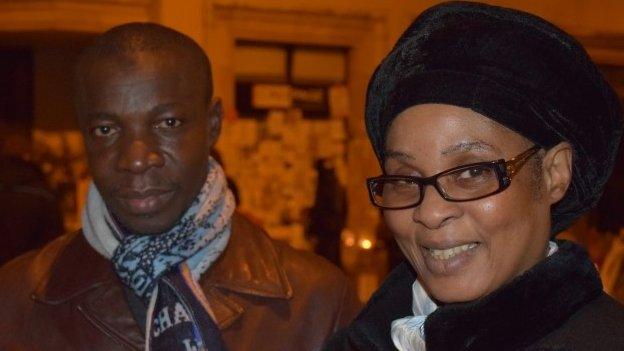
Berthe Tereta: "They say they are Muslims but they don't even know their own religion"
"The human being is sacred for Muslims so I have come to bear witness that no-one should surrender to fear before these barbarians," he says, standing alongside his wife Fatoumata.
"They say they are Muslims but they don't even know their own religion. I wouldn't even call them fanatics - they were gangsters pure and simple.
"Nobody should be afraid and nobody should tolerate gangsters.
"All I ask is that you try to know the religion you have chosen, be you Christian, Jew or Muslim. If you know your religion properly, you will not get up one morning and go off to kill your neighbour over a word or a cartoon."
'Sick people'
Dominique Secher also came to the vigil to show his support for a magazine he grew up with.
"I didn't always buy it but I knew all the cartoons," he recalls.
Asked if France has changed since the attack, he says the one thing that has impressed him is the strength of the public's reaction, how people have come out to defend press freedom.
"There are other sick people, other idiots, still on the loose," he adds. "I hope the cops will get a move on to stop this happening again in France or anywhere else."
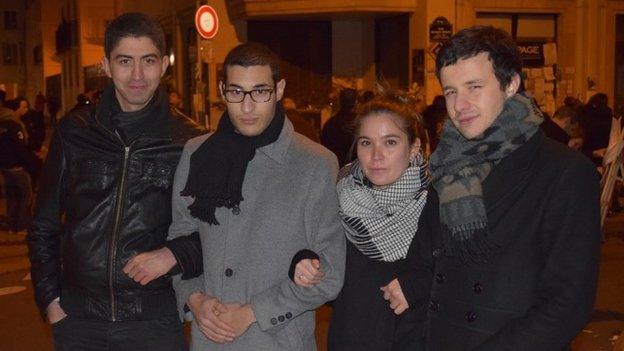
Rayan (second from left) came with his friends to spare a "thought for the victims and not forget what happened"
Laurent was in a nearby cafe with friends on the day of the shooting, and noticed how the street suddenly filled with police.
He came to the vigil to "reflect in silence in the night". The cartoonists, he says, can be regarded as heroes who "stood by freedom and press freedom to the end". People will now value their freedoms more, he suggests.
Rayan came with his friends to spare a "thought for the victims and not forget what happened".
Hearing the news at work on Wednesday had been a "shocking, surreal" experience.
He hopes the rally on Sunday will help people to draw something positive from the event.
'Society's challenge'
For businessman Tino Duarte, the main lesson to be drawn is that if society creates "rejects", they can easily fall prey to criminals and fanatics.
"When children do not get a good education, when values are not handed down, when they are not equipped for life, when failure leaves them without prospects, disasters like this happen," he says.
"You need to take children in hand at an early age and stand by them. Without that, anyone can be manipulated and end up committing irreparable acts."